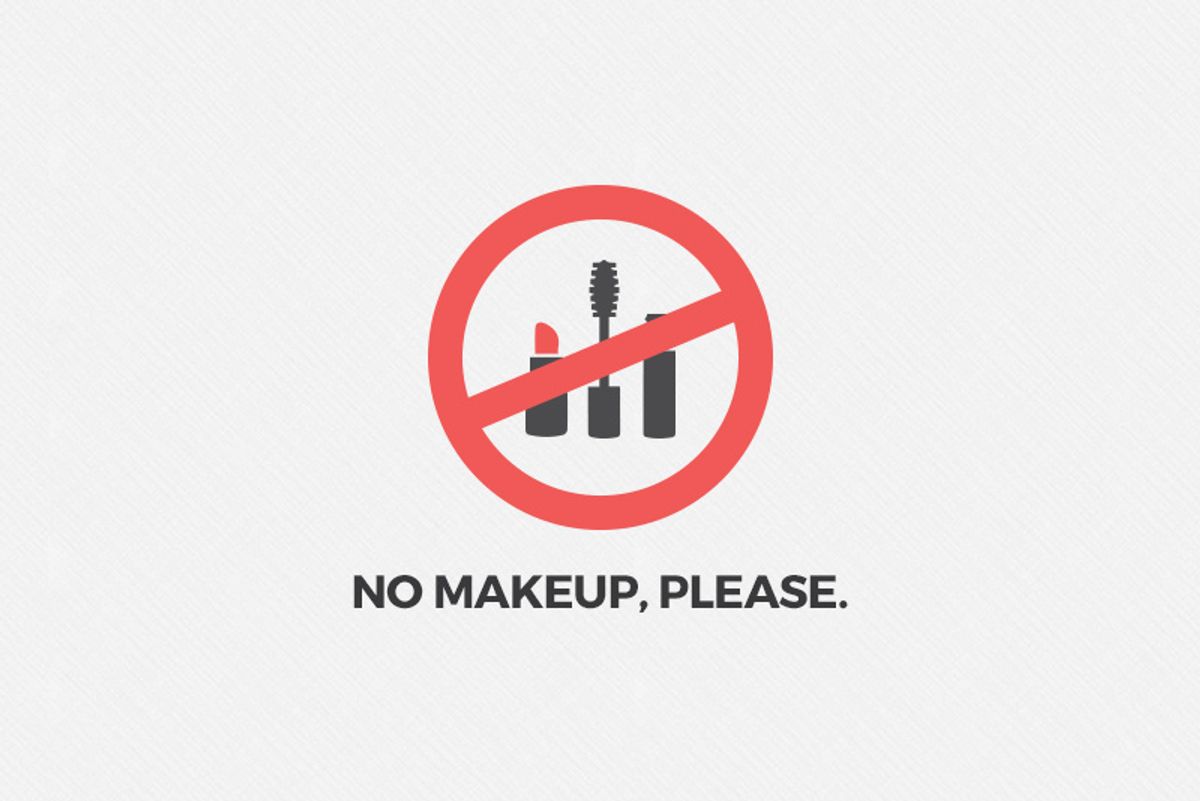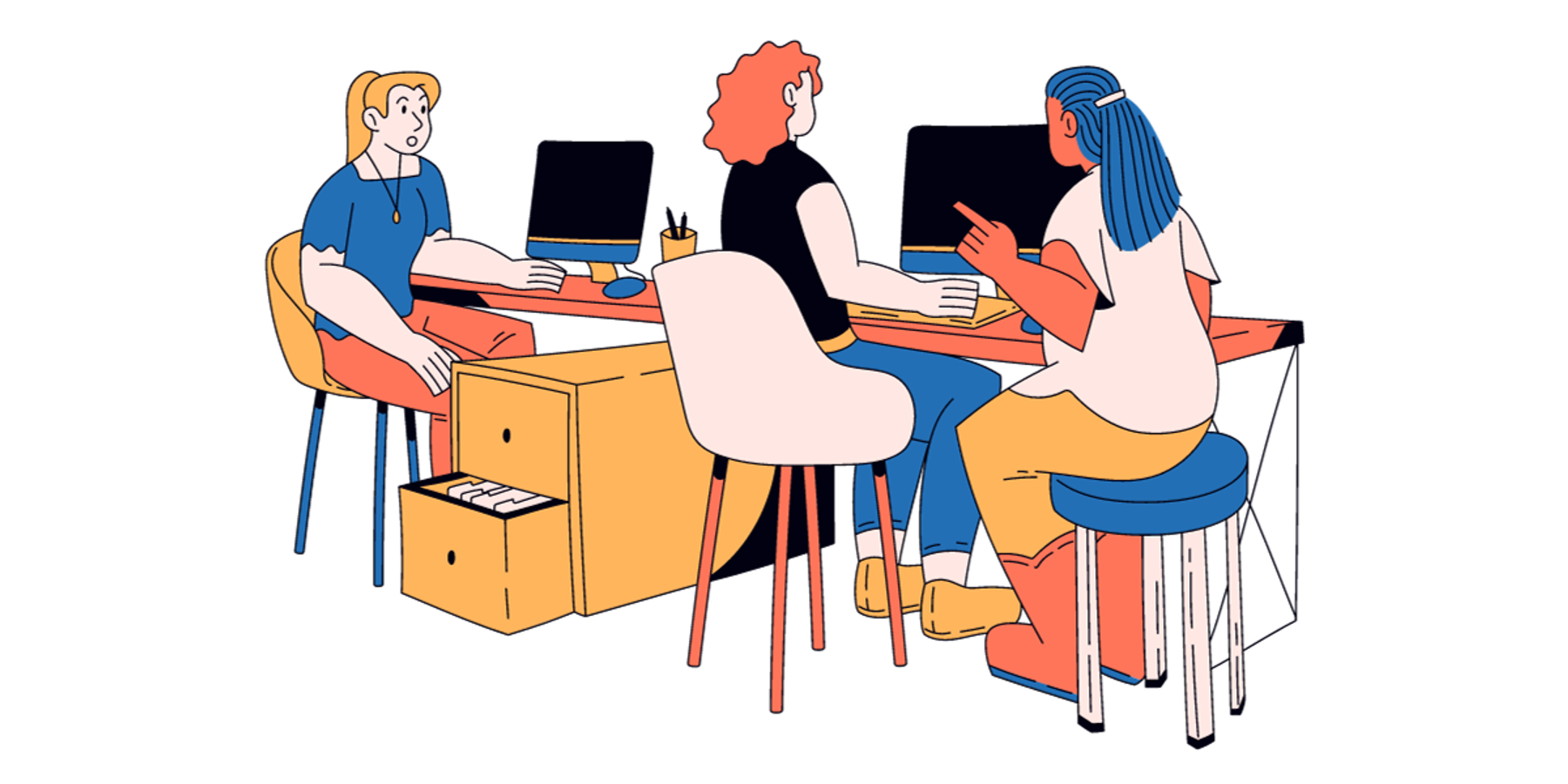A version of this article previously appeared on Skillcrush, an online education program for creatives, thinkers, and makers that gives total tech newbies the tools to make major career changes.
Julia Sonenshein, Skillcrush
When celebrities left and right started announcing they're off the makeup train in favor of more natural (read: less obvious but still made up) looks, I rolled my eyes. I simply couldn't muster any feelings about the performative unburdening of it all—cloaked as it was in superficial empowerment. (Celebrities: I know you are still wearing makeup. You aren't helping anyone).
My personal relationship to makeup can only be described as "whatever": I typically don't leave the house without some undereye concealer and a bit of mascara, even if I'm just going to get coffee or go for a walk, but a usual day is pretty limited to exactly that. Some would call that low maintenance, others would say that's ludicrous. Whatever.
But things change if I'm in a work environment. No matter how laid back the office—open floor plan, nap pods, coworkers who bring their puppies—I'm in full makeup. Not the fun, creative kind of makeup, but boring, workhorse makeup: concealer covering the shadows under my eyes, some powder toning down the redness of my nose, and cheek tint so I don't look quite so pasty. If anything, I'm going for that look all the celebrities are pretending is so noble: I just woke up this way, perfectly unblemished, vibrant, and inoffensive.
It's not the look I might try on the weekends when I put on some winged eyeliner or red lipstick. This makeup is to appear ostensibly "professional," or in reality, to pretend not to be a human person with flaws. This routine hasn't felt like a choice.
One day on the way to work, it was so humid and gross out that my makeup fully melted off of my face, and I wiped it off before I got to the office. Three people asked me if I was feeling ill or if I needed to go home. They looked uncomfortable when I deadpanned, "This is just what my face looks like."
At another job, a cut on my eyelid prevented me from wearing makeup for a few days and my boss told me to go home because I looked unprofessional. Never mind that a male colleague a few seats over had obvious undereye shadows and unkempt hair. The message was clear: In the office, men are fine as they are, imperfections and all. Women, on the other hand, must be improved.
I hadn't given this much thought—radical feminist as I am—because it was simply so deeply ingrained in my consciousness. But everything came into sharp focus when I started working at Skillcrush, where we're all remote and working from home offices on multiple continents. We have video meetings all the time—and when I joined the team, I would wake up, do my hair and makeup, and walk ten feet to my computer. Then I rolled my eyes at how ridiculous it all was to wipe off my makeup at the end of the day after not even leaving the house.
About two weeks in, I realized that I was squarely in the minority of employees putting on the ritz to sit in their own house—if not the only one. My coworkers looked happy and comfortable in their work environments, while I was squirming in my "professional" bra.
I couldn't figure out why everyone felt so comfortable being themselves, and I envied it until it finally dawned on me. Our CEO—everyone's boss—doesn't wear makeup most of the time when she meets with us from her home office, and culture starts at the top. It seems small, but it means that we don't have to, either. She offered us flexible jobs we could do from home and then demonstrated what it actually looks like to fit in your job around your life.
It's not enough to have an employee handbook full of platitudes about how cool your company is—if your boss doesn't take vacations, you won't, either. If your boss encourages risks but won't take them herself, you can't be expected do the same.
When culture starts at the top, it's a way for companies to walk the walk, and in our case, it instills gender parity when it comes to how we define "professionalism." And for a company that allows us to work from home on our schedule, it makes clear that we don't just have to trade the commute—we can also ditch gendered expectations about how we should present.
The idea of choosing whether or not to wear makeup to work might seem trivial, but I'd argue that the way women are expected to look at work is one of the many ways in which all women are held to a double standard in the workplace (not to mention the discriminatory, racist ways in which Black women are held to BS definitions of "professionalism" that don't include natural hair). It's not as simple as picking up the lipstick or not—it's about how women are perceived as professional or not based on something as silly as how they look.
Makeup is fun and anyone can and should wear it whenever they want. Even in my liberated new working world of undereye circles and air-dried hair, I sometimes dab on some lipstick for an afternoon pick-me-up. But exactly zero of my coworkers have ever asked if I'm tired, sick, or questioned my ability to do my job, especially while high-fiving a bro in a hoodie at the next desk. About damn time.
Want your own remote job where you're not expected to wear makeup every day? Check out the Ultimate Guide to Getting a Remote Job You Love for all the insider info on how to land your remote dream job.




